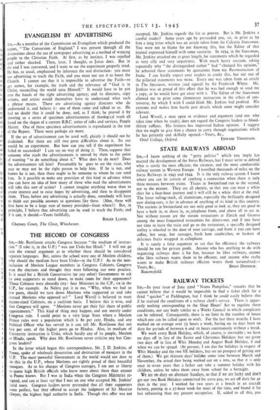EVANGELISM BY ADVERTISING
Sw,—As a member of the Commission on Evangelism which produced the report, " The Conversion of England," I was present through all the discussions about the use of newspaper advertising as a method of winning people to the Christian Faith. At first, as by instinct, I was repelled and rather shocked. Then, later, I thought, as Janus does. But in the end I was converted, and I want to see the experiment properly tried. He has, as usual, emphasised by inference the real distinction: you must use advertising to teach the Faith, and you must not use it to boost the Church. I cannot see that it is impossible to advertise the Faith—to get across, for example, the truth and the relevance of " God is in Christ, reconciling the world unto Himself." It would have to be put into the hands of the right advertising agency; and its directors, copy writers, and artists would themselves have to understand what such a phrase means. There are advertising agency directors who do understand it, and believe it: one of them came and talked to us. He had no doubt that it could be done, and, as I think, he proved it by showing us a series of specimen advertisements of theological truth all based on the slogan of a current B.B.C. series of talks and services, People Matter. One of these specimen advertisements is reproduced in the text of the Report. There were perhaps six more.
If the art of advertisement can be used well, plainly it should not be disdained. But there are still two• great difficulties about it. Its use would be an experiment. But how can you tell if the experiment has failed or succeeded? I can see no way of doing it. Then, suppose that someone who reads the advertisements is moved by them to the point of wanting " to do something about it." What does he do next? Does the advertisement tell him? Presumably he goes to see the vicar, who may or may not be the right person to help him. If he is not, and knows he is not, then there ought to be someone to whom he can send him. Is it possible to make any provision of this kind in advance when you can have no idea of how many of those who read the advertisments will take this sort of action? I cannot imagine anything worse than to create interest and to raise hopes by advertising, and then to disappoint them. Thus,-before any advertising is actually done, somebody will have to think out possible answers to questions like these. (Also, there will first have to be a large sum of money provided—from where?) But, in principle, I believe that advertising can be used to teach the Faith; and if it can, it should.—Yours faithfully,
ROGER LLOYD.
Cheyney Court, The Close, Winchester.


























 Previous page
Previous page